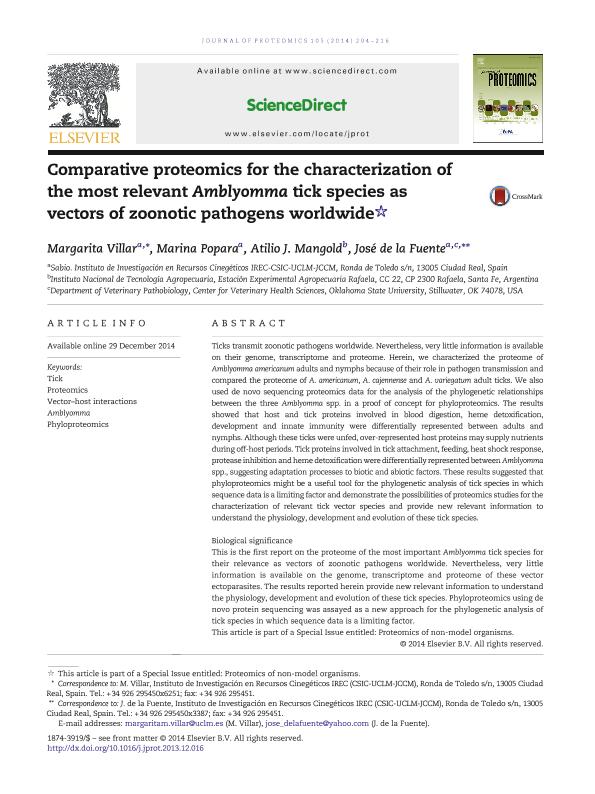Mostrar el registro sencillo del ítem
dc.contributor.author
Villar, Margarita
dc.contributor.author
Popara, Marina
dc.contributor.author
Mangold, Atilio Jose

dc.contributor.author
de la Fuente, José
dc.date.available
2019-10-01T18:30:41Z
dc.date.issued
2014-06
dc.identifier.citation
Villar, Margarita; Popara, Marina; Mangold, Atilio Jose; de la Fuente, José; Comparative proteomics for the characterization of the most relevant Amblyomma tick species as vectors of zoonotic pathogens worldwide; Elsevier Science; Journal Of Proteomics; 105; 6-2014; 204-216
dc.identifier.issn
1874-3919
dc.identifier.uri
http://hdl.handle.net/11336/84956
dc.description.abstract
Ticks transmit zoonotic pathogens worldwide. Nevertheless, very little information is available on their genome, transcriptome and proteome. Herein, we characterized the proteome of Amblyomma americanum adults and nymphs because of their role in pathogen transmission and compared the proteome of A. americanum, A. cajennense and A. variegatum adult ticks. We also used de novo sequencing proteomics data for the analysis of the phylogenetic relationships between the three Amblyomma spp. in a proof of concept for phyloproteomics. The results showed that host and tick proteins involved in blood digestion, heme detoxification, development and innate immunity were differentially represented between adults and nymphs. Although these ticks were unfed, over-represented host proteins may supply nutrients during off-host periods. Tick proteins involved in tick attachment, feeding, heat shock response, protease inhibition and heme detoxification were differentially represented between Amblyomma spp., suggesting adaptation processes to biotic and abiotic factors. These results suggested that phyloproteomics might be a useful tool for the phylogenetic analysis of tick species in which sequence data is a limiting factor and demonstrate the possibilities of proteomics studies for the characterization of relevant tick vector species and provide new relevant information to understand the physiology, development and evolution of these tick species. Biological significance: This is the first report on the proteome of the most important Amblyomma tick species for their relevance as vectors of zoonotic pathogens worldwide. Nevertheless, very little information is available on the genome, transcriptome and proteome of these vector ectoparasites. The results reported herein provide new relevant information to understand the physiology, development and evolution of these tick species. Phyloproteomics using de novo protein sequencing was assayed as a new approach for the phylogenetic analysis of tick species in which sequence data is a limiting factor. This article is part of a Special Issue entitled: Proteomics of non-model organisms.
dc.format
application/pdf
dc.language.iso
eng
dc.publisher
Elsevier Science

dc.rights
info:eu-repo/semantics/openAccess
dc.rights.uri
https://creativecommons.org/licenses/by-nc-sa/2.5/ar/
dc.subject
AMBLYOMMA
dc.subject
PHYLOPROTEOMICS
dc.subject
PROTEOMICS
dc.subject
TICK
dc.subject
VECTOR-HOST INTERACTIONS
dc.subject.classification
Otras Ciencias Veterinarias

dc.subject.classification
Ciencias Veterinarias

dc.subject.classification
CIENCIAS AGRÍCOLAS

dc.title
Comparative proteomics for the characterization of the most relevant Amblyomma tick species as vectors of zoonotic pathogens worldwide
dc.type
info:eu-repo/semantics/article
dc.type
info:ar-repo/semantics/artículo
dc.type
info:eu-repo/semantics/publishedVersion
dc.date.updated
2019-09-27T14:14:41Z
dc.journal.volume
105
dc.journal.pagination
204-216
dc.journal.pais
Países Bajos

dc.journal.ciudad
Amsterdam
dc.description.fil
Fil: Villar, Margarita. Consejo Superior de Investigaciones Científicas; España. Universidad de Castilla-La Mancha. Instituto de Investigación en Recursos Cinegéticos; España
dc.description.fil
Fil: Popara, Marina. Consejo Superior de Investigaciones Científicas; España. Universidad de Castilla-La Mancha. Instituto de Investigación en Recursos Cinegéticos; España
dc.description.fil
Fil: Mangold, Atilio Jose. Consejo Nacional de Investigaciones Científicas y Técnicas. Centro Científico Tecnológico Conicet - Santa Fe; Argentina. Instituto Nacional de Tecnología Agropecuaria. Centro Regional Santa Fe. Estación Experimental Agropecuaria Rafaela; Argentina
dc.description.fil
Fil: de la Fuente, José. Oklahoma State University; Estados Unidos. Consejo Superior de Investigaciones Científicas; España. Universidad de Castilla-La Mancha. Instituto de Investigación en Recursos Cinegéticos; España
dc.journal.title
Journal Of Proteomics

dc.relation.alternativeid
info:eu-repo/semantics/altIdentifier/doi/https://doi.org/10.1016/j.jprot.2013.12.016
dc.relation.alternativeid
info:eu-repo/semantics/altIdentifier/url/https://www.sciencedirect.com/science/article/pii/S1874391913006519
Archivos asociados
